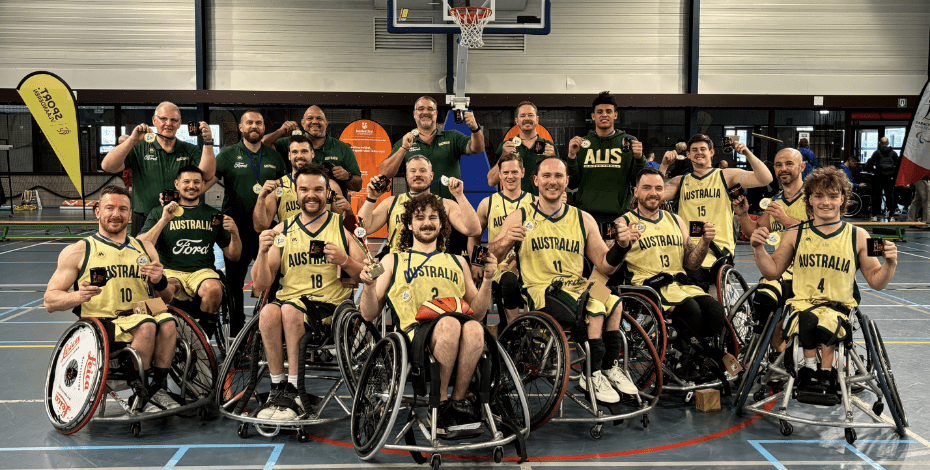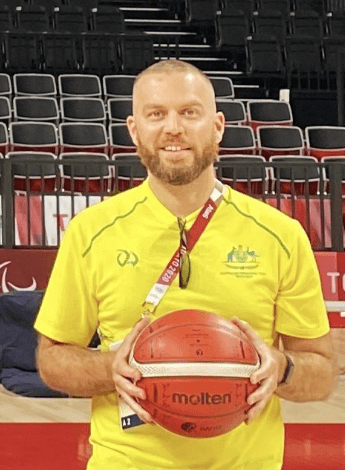
Rolling up to the Paris Paralympics

APA PEOPLE Australian Paralympic team physiotherapist Ryan Campbell is hoping for the full Paralympic experience in France this month after being part of a drastically altered Paralympics in Japan during the COVID-19 pandemic. Ryan discusses his hopes for the Games and the thrill of working with the Australian men’s national wheelchair basketball team.
Two days after the Australian men’s wheelchair basketball team, the Rollers, played against Iran at the 2020 Tokyo Paralympics (held in 2021), one of the Iranian players tested positive for COVID.
This immediately sent the Rollers and the team support staff, including physiotherapist Ryan Campbell MACP, into isolation on the floor of their hotel.
Food and supplies were delivered to their rooms but no one was permitted to leave unless it was for competition or training purposes.
Although excited to be working as the team physiotherapist at the Tokyo Paralympic Games, Ryan feels that this deeply affected his first experience of the Paralympics.
When the 2024 Paris Paralympics get underway on 28 August, Ryan hopes there will be none of the restrictions that he and the team encountered in Japan.
‘I’m looking forward to getting the true experience because I didn’t have that last time,’ Ryan says, recalling the vaccine mandates, quarantine obligations and continual revision of plans that beset the Tokyo Games.
Mixing with his physiotherapist peers in the dining hall—the unofficial hub of any Olympic or Paralympic Games— was also off the cards in Tokyo and it is something that Ryan is keen to do in Paris.
‘If you have goals that you want to achieve in physiotherapy, networking absolutely opens the door for that,’ says Ryan.
‘I missed that opportunity in Tokyo so I’m looking forward to it this time.’
At the top of Ryan’s wish list for Paris, though, is the success of the Rollers on the court.
As the team physiotherapist, Ryan will be responsible for taking care of the players’ physical readiness for competition.
He will also deliver maintenance treatments for any ongoing physical conditions the players may have and address injuries that crop up during pre-competition training or during the Games.
Experience has taught Ryan that prevention and management of medical conditions is a key contributor to the team’s success on the court.
‘My goal is always just to do the best I can within my capability to keep the Rollers fit and healthy.
'We do have a good record of being injury-free during tournaments and I’d obviously like to maintain that,’ Ryan says.
‘During the selection period, while they’re still vying to be chosen for the team, there is a lot of stress and anxiety among some of the players.
'This can feed into and contribute to an injury and it can also stop someone getting better from an injury.
'The mental health aspect is tricky to navigate until selection.’
Ryan is an APA Sports and Exercise Physiotherapist and the director of Wanneroo Physiotherapy, a practice he attended as a young patient in the northern suburb of Perth, Western Australia, where he grew up.

Ryan Campbell.
Ryan is also a performance physiotherapist with the Western Australian Institute of Sport, working with the wheelchair basketball, hockey and individual athlete programs as well as with the Rollers three days a week.
For the remaining two days, he maintains a client list at his practice, making him adept at wearing multiple hats as he performs his various roles.
Two years after he graduated from Curtin University in 2008, Ryan began working with the Western Australian State Basketball League (now NBL1 West) team, the Joondalup Wolves.
The head coach of the Wolves also happened to coach the Rollers and after building a strong working relationship with him over a couple of years, Ryan was offered the chance to travel with the Rollers’ junior development team to Dubai in 2012.
He knew nothing about wheelchair basketball and readily admits he’d never even watched a game.
‘If you had asked me to name a Paralympic athlete back then, I would have struggled. Unfortunately, this was commonplace for many people at the time.
'While the Olympics were shown on the ABC, the Paralympic Games coverage was on a separate TV station—on a single channel and for only part of the day as a highlights package. Within sports media, very few athletes with a disability were reported on.
'Nor were they featured as guests on TV shows, on radio or in advertisements. They weren’t visible.
‘My perceptions of people with disability were based on negative stereotypes due to the way they were portrayed in books,
TV shows and movies.
'They were typically cast as victims, helpless objects of pity and sympathy, the butt of a joke or outcasts. Since then, these perceptions have changed dramatically,’ Ryan says.
Ryan will be in Paris with some of the players who were on that junior team in Dubai back in 2012—they’re now representing their country with the Rollers.
What Ryan has learned in the intervening 12 years about the sport and its athletes has changed his understanding of people with a disability and this mirrors a gradual shift in perception among the broader community.
Ryan says the popularity of the London Paralympic Games in 2012 has been credited with driving increased visibility of athletes
with disability, paving the way for more recognition of sporting superstars such as Australian former wheelchair tennis and wheelchair basketball player Dylan Alcott.
‘Having spent a lot of time with people with disability, I found that my own perceptions changed significantly.
'But it’s great to see that the public’s perceptions have shifted too,’ Ryan says.
‘Because of my experience working with athletes who live with disability, I am regularly asked to provide placements for postgrad physios wanting to work in this space.
'I had a student—who is doing his postgrad at La Trobe University and lives in Canberra—do a placement with me at the Western Australian Institute of Sport because he wanted to gain experience with Paralympic sport.
'I might get five physios a year asking me to come and talk to them about my career and to see if I can help them find opportunities in Paralympic sport.
'I think clinicians are now craving that opportunity and it’s really cool to see that change.’
This month Ryan and the Rollers will make their way to Paris for the ultimate competition for athletes with a disability.
Ryan needs to be at the top of his game—he is expecting a high workload at team headquarters with his fellow Australian physiotherapists.
Joining him (pending accreditation at the time of publication) are:
- APA Sports and Exercise Physiotherapist Victoria Moore MACP
- Specialist Sports and Exercise Physiotherapist (as awarded by the Australian College of Physiotherapists in 2023) Bernadette Petzel FACP
- APA Sports and Exercise Physiotherapist Darren McMillan MACP
- APA Sports and Exercise Physiotherapist Brett Doring MACP
- APA Sports and Exercise Physiotherapist Krystal Sharp MACP
- Specialist Sports and Exercise Physiotherapist (as awarded by the Australian College of Physiotherapists in 2019) Paula Peralta FACP
- APA Sports and Exercise Physiotherapist Madeleine Thompson MACP
- APA Sports and Exercise Physiotherapist Nicholas Wilson MACP
- APA Sports and Exercise Physiotherapist Sarah Hammond MACP
- Specialist Sports and Exercise Physiotherapist (as awarded by the Australian College of Physiotherapists in 2018) Vassilia Giovanovits FACP
- APA Sports and Exercise Physiotherapist Kate O’Connell MACP
- APA Sports and Exercise Physiotherapist Eliza Smyth MACP
- APA Sports and Exercise Physiotherapist Katie Sandford MACP
- Ben Frick APAM.
Full-spectrum care for the Rollers
A common misconception about treating athletes in the Australian men’s wheelchair basketball team, the Rollers, is that the
work for physiotherapists mostly involves the upper body.
Not so, says their team physiotherapist Ryan Campbell, explaining that while there is some upper body work required, that is by no means the limit.
'People assume that because they’re primarily using their upper bodies, it’s all upper body injuries, particularly the shoulders.
'And it’s true that shoulder injuries are the most common but we’ve got a range of disabilities on our team,’ Ryan says.
‘Some of our athletes are amputees so they walk around on their prostheses during the day and can get lower back pain or pain in their remaining leg.
'Those who are full-time wheelchair users get a lot of back and neck pain from prolonged sitting and from the travel as well.
'We treat everything but shoulders, elbows and wrists are the most common things we would see.’
At the team headquarters in Paris, Ryan will be on hand for the full spectrum of team activities so he is expecting some early mornings and late nights.
The team will generally get together in the mornings for a team stretch, run by Ryan, followed by individual monitoring of the athletes which includes following up on treatments, injury rehabilitation and illness status.
‘Then at some point we’ll have a training session.
'In pre-training, I’ll do a bit of treatment and a bit of taping and address anything that comes up during a training session.
'Once we come back from training or a game, I’ll usually do a block of treatment,’ Ryan says.
‘As the Games roll on, the guys start getting a bit tired and sore and the requirement for me increases.'
In Paris, the athletes will have access to a host of medical resources including team doctors and massage therapists at a recovery centre as well as the services provided by the physiotherapists.
The Rollers team comprises players from around Australia and overseas and the athletes will have the opportunity to acclimatise, train as a team, review the game plan, strategise and get in some practice matches before the Games start on 28 August.
COURSE OF INTEREST: Sports Physiotherapy Level 2
© Copyright 2025 by Australian Physiotherapy Association. All rights reserved.





